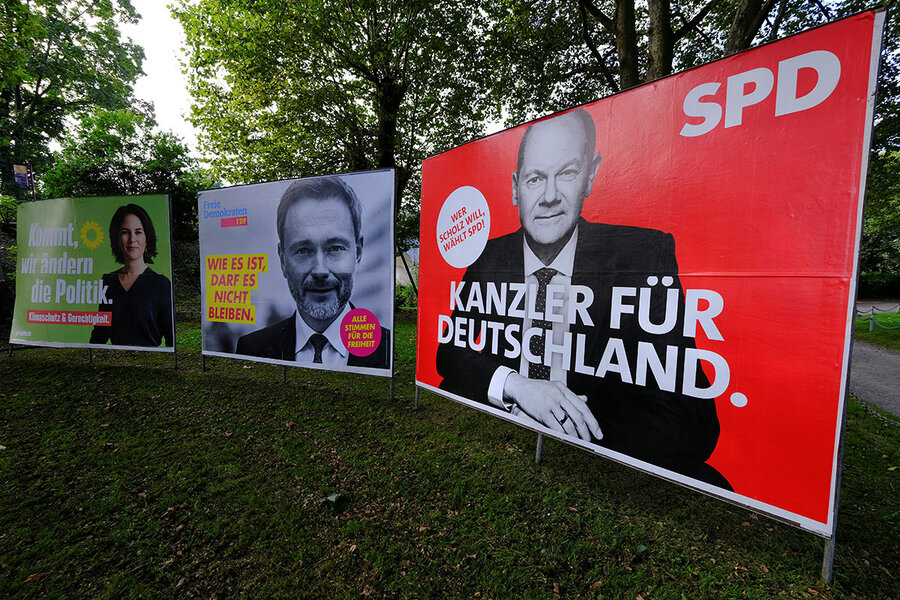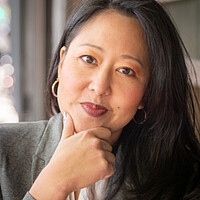German coalition talks: What do they reveal about Germany’s future?
Loading...
| Berlin
With Germany’s federal elections finally in the books, the country’s parties are now tasked with determining who will replace Angela Merkel as chancellor. For the first time in decades, three parties will be needed to form a governing coalition.
The calculus that requires three parties to form a coalition gives unusual power to two smaller parties: The Greens (14.8%) and the Free Democrats (FDP, 11.5%). These two parties – which are both socially liberal but divided on economics – will be hammering out policy differences and finding commonalities. Meanwhile, Olaf Scholz and his center-left Social Democrats (SPD), which edged Ms. Merkel’s center-right Christian Democratic Union (CDU) by 1 1/2 points, will be waiting for their phone call.
Why We Wrote This
Germany’s first post-Merkel election promises to reshape the country’s governing priorities. They can begin to be seen as the parties thrash out a new, likely three-party coalition.
Pundits predict that the most likely government will be a “traffic light” coalition – red for SPD, yellow for FDP, and green for, appropriately, The Greens. Still, the result is not a clear repudiation of the CDU’s mainstream policies.
“A traffic light coalition would definitely be a move to the center-left, but it will be capped by the free-market-oriented FDP,” says Aaron Allen with the Center for European Policy Analysis. “Olaf Scholz is an experienced, competent politician, and I don’t think he’ll rock the boat that much.”
With Germany’s federal elections finally in the books, the country’s parties are now tasked with determining who will replace Angela Merkel as chancellor. In a break from Ms. Merkel’s 16 years at the helm of the European Union’s most powerful country, her center-right Christian Democratic Union (CDU) came in second to the center-left Social Democrats (SPD). Ms. Merkel will stay in power until coalition negotiations are concluded – but for the first time in decades, three parties will be needed to form a governing coalition.
Why is needing three parties a big deal?
The calculus that requires three parties to form a coalition gives unusual power to two smaller parties: The Greens (14.8%) and the Free Democrats (FDP, 11.5%). These two parties – which are both socially liberal but divided on economics – will be hammering out policy differences and finding commonalities. Meanwhile, Olaf Scholz and his SPD, which edged Ms. Merkel’s CDU by 1 1/2 points, will be waiting for their phone call.
Why We Wrote This
Germany’s first post-Merkel election promises to reshape the country’s governing priorities. They can begin to be seen as the parties thrash out a new, likely three-party coalition.
Pundits predict that the most likely government will be a “traffic light” coalition – red for SPD, yellow for FDP, and green for, appropriately, The Greens. That said, the CDU will also be meeting with the FDP; it’s unlikely, but possible that the CDU could still negotiate its way into a “Jamaica” ruling coalition (green, yellow, and black; the CDU’s color is black) should The Greens and the FDP choose to rule with it instead.
Having three ruling parties could mean policymaking stasis; more voices means potentially more squabbling. Yet a multiparty coalition signals a new era in German politics, whereby the political landscape has fragmented, and more small parties will be consistently vying for votes.
What does the vote say about how Germany has changed?
At the very least, the CDU’s loss was a clear repudiation of its candidate for chancellor, Armin Laschet. Mr. Laschet is famously gaffe-prone, and the party accustomed to ruling Germany with Ms. Merkel at the helm has reached a moment of reckoning after experiencing a 9-point drop from the 2017 federal election.
That said, the result is not a clear repudiation of the CDU’s mainstream policies. The SPD’s Mr. Scholz is business-friendly and generally hews to the right of his party’s center-left platform.
“A traffic light coalition would definitely be a move to the center-left, but it will be capped by the free-market-oriented FDP,” says Aaron Allen, analyst with the Center for European Policy Analysis. “Olaf Scholz [the leading contender for chancellor] is an experienced, competent politician, and I don’t think he’ll rock the boat that much.”
Yet, with first-time voters gravitating in the largest shares to The Greens and the FDP, there’s a clear signal that Germany’s political landscape has significantly shifted away from the traditional large parties.
What does the delay in government formation mean for Germany’s role in the EU?
In a press conference earlier this week, Mr. Scholz remarked that a coalition government should be formed “by Christmas.” That’s three long months away, and in that time, consequential events such as the United Nations climate change conference in Glasgow, Scotland, will be taking place. Germany also faces important challenges such as ongoing management of the COVID-19 outbreak, and how it might handle a multibillion-dollar pandemic-related deficit.
Ms. Merkel will be chancellor until a new government is announced, and her presence until then will provide continuity. “But the European Union is in very bad shape, because we have no strategic direction or ideas about what we want to be, or how we want to renew the transatlantic relationship,” says Judy Dempsey, senior fellow at Carnegie Europe. “We’re also so divided over China. We need direction on how we’re going to tackle these major challenges.”
Still, the likeliest traffic light coalition would not present a wholly radical departure from past policies, so if Ms. Merkel holds course, it should flow into whatever government comes next.
Yet nitty-gritty details on where Germany’s priorities will lie, and how leadership sees its responsibilities as far as the European Union and global alliances, will have to wait. The faster Germany can start down the road with clear leadership, the better for Europe.










